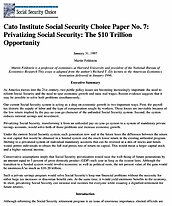Our current Social Security system is acting as a drag on economic growth in two important ways. First, the payroll tax distorts the supply of labor and the type of compensation sought by workers. These losses are inevitable because of the low return implied by the pay-as-you-go character of the unfunded Social Security system. Second, the system reduces national savings and investment.
Privatizing Social Security, transforming it from an unfunded pay-as-you-go system to a system of mandatory private savings accounts, would solve both of those problems and increase economic growth.
Under the current Social Security system, each generation now and in the future loses the difference between the return to real capital that would be obtained in a funded system and the much lower return in the existing unfunded program. Shifting to a privatized system of individual mandatory accounts that can be invested in a mix of stocks and bonds would permit individuals to obtain the full real pretax rate of return on capital. This would mean a larger capital stock and a higher national income.
Conservative assumptions imply that Social Security privatization would raise the well-being of future generations by an amount equal to 5 percent of gross domestic product (GDP) each year as long as the system lasts. Although the transition to a funded system would involve economic as well as political costs, the net present value of the gain would be enormousas much as $10–20 trillion.
Such a private savings program would solve Social Security’s long-run financial problems without the necessity for either huge tax increases or draconian benefit cuts. At the same time, it would yield enormous benefits to the economy. In short, privatizing Social Security can increase real incomes for everyone while ensuring a dignified retirement for future retirees.

